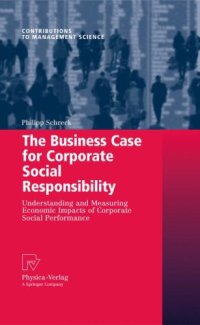
Ebook: The Business Case for Corporate Social Responsibility: Understanding and Measuring Economic Impacts of Corporate Social Performance
Author: Dr. Philipp Schreck (eds.)
- Genre: Economy
- Tags: Organization/Planning, Ethics, Business/Management Science general
- Series: Contributions to Management Science
- Year: 2009
- Publisher: Physica-Verlag Heidelberg
- Edition: 1
- Language: English
- pdf
In recent times, scholars and practitioners have equally been attracted by the notion that Corporate Social Responsibility (CSR) need not merely be a costly obligation to private business but can sometimes be in the very interest of companies themselves. This Book forms a conceptual analysis of and an empirical study on this business case for CSR. CSR is thereby understood as a multi-dimensional and multi-relational concept which relates to the responsibilities ascribed to companies by various stakeholders. In contrast to the mainly normative discussions on CSR in Germany, this study analyses empirical antecedents and financial impacts of corporate social performance (CSP). It adds to the long lasting research tradition on the business case for CSR by employing hitherto unused data on CSR. The study proposes additional statistical analyses to account for the widely neglected econometric problem of endogeneity due to simultaneous causality. Although the results indicate that CSR can be in line with economic goals in some cases, they do not support the assumption of a generic or even universal business case for CSR.
In recent times, scholars and practitioners have equally been attracted by the notion that Corporate Social Responsibility (CSR) need not merely be a costly obligation to private business but can sometimes be in the very interest of companies themselves. This Book forms a conceptual analysis of and an empirical study on this business case for CSR. CSR is thereby understood as a multi-dimensional and multi-relational concept which relates to the responsibilities ascribed to companies by various stakeholders. In contrast to the mainly normative discussions on CSR in Germany, this study analyses empirical antecedents and financial impacts of corporate social performance (CSP). It adds to the long lasting research tradition on the business case for CSR by employing hitherto unused data on CSR. The study proposes additional statistical analyses to account for the widely neglected econometric problem of endogeneity due to simultaneous causality. Although the results indicate that CSR can be in line with economic goals in some cases, they do not support the assumption of a generic or even universal business case for CSR.